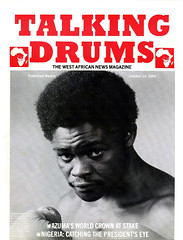What The Papers Say
The Guardian, Nigeria, October 1, 1985
It’S Time For Cheers
These unreserved greetings come not because Nigerians are enjoying great happiness today; not because Nigeria is the most prosperous country in the world; not because we have realised all those dreams that bustled within our hearts years ago. We endorse today's flag-waving and anthem- chanting because, when all is said and done, this country must count herself lucky.
In a country that has been plagued by such poor, and irresponsible leadership for 25 years, we must be modest enough to admit that it could have been worse. In a generation in which Nigerians were brought up to see governments as all in all we managed to carry on. In a country that experienced 30 months of bitter and divisive civil war, we must be thankful to be here today chanting ‘One Nigeria'! In a country that has suffered such great political instability and with such treacherous ethnic suspicions, we have proceeded in such tremendous peace. We recognise that Nigerians have good reason to be disillusioned. It is part of Nigeria's emerging national character that her nationals would not accept second best. Ours is a defeated and mismanaged nation. Our huge material and man resources have not been used to improve the lot of people, or to put the nation on the road to a feasible, defined future. The story of our first 25 years is the story of the nation's wealth being stupidly squandered or corruptly appropriated by the ruling class, resulting in a sickening plethora of false starts in various areas and eras in our political and economic life.
Thus, 25 years after independence, we neither have reliable census figures, nor have we been able to conduct free, fair and conclusive elections. Good drinking water eludes the majority of our citizens. A bumper harvest of food items is regularly all over the land, but alas, only in the press, courtesy of government officials. Medical care remains the preserve of the elite, being both scarce and expensive. Unemployment is a spreading scourge. The groundnut pyramids of Kano have fled the country. Education is growing more and more expensive. We now import things we exported at independence.
This is not to suggest that Nigeria has been stagnant for all of her 25 years. On the contrary, huge expressways now link the major towns and cities, shortening journeys, in some cases, by hours. There are airports in most state Capitals, and the national airline boasts of some of the latest aircraft in civil aviation. As against one university in 1960, the nation now has 24. Our federal system has moved from four regions to 19 states. Motor vehicles have multiplied many thousands of times. These examples can be cited as evidence of growth, but they are a classic case of growth without development. None of them functions optimally to the benefit of Nigerians at the grassroots of our social, political and economic experience.
But nothing symbolically demonstrates the state of Nigeria today than the hypothetical experience of a man born at independence. Twenty-five years old now, he would have left the university after taking one or two degrees. His prospects would have started to grow dimmer each day and would try to return to school for higher studies because places are seriously limited; even if he could find one, he cannot pay. He cannot pay for accommodation, and feeding is difficult. Frustration stares him in the face, and to carry on he must borrow, as he is steadily learning to do.
By a curious coincidence, the debate regarding whether the country should take the IMF loan is raging at the moment, punctuated only by activities marking this anniversary. Nigeria is showing interest in the loan because she has played the true prodigal son for the past 15 years. The argument is being made that to remain where we are, we have to borrow. Once again, the ordinary people of Nigeria, crouching in hunger and deprivation beneath the babble of the elite, unconsulted and disregarded, have very little idea of what is going on.
All this means, of course, that we have come through our first 25 years with something like a confused compass, confusion usually in attendance because frequently, sometimes simultaneously, different bands of travellers have held and 'interpreted' the compass. However, if neither the military nor civilian rulers have been able to take Nigeria faster and further away from 1960, Nigerians may be glad for the lessons they have learnt, and the tremendous gains that have been made even if only by default.
In the course of our trials and tribulation, we have acquired a fairly sophisticated and discerning political culture, and a vibrant, irrepressible press. Whoever rules now, and whatever his dress or the weapons he may choose to employ, he will find Nigerians ready and willing to be part of the determination of their destiny.
We may not have realised our dreams as we held them fondly and flutteringly to our hearts in 1960, but we are still here, and we can polish them to a fresh glitter, or even dream new dreams. We have acquired self-assurance as a people that tells us that whoever wishes to tamper with our dreams hopes and image of ourselves has to be prepared for battle.
But perhaps the greatest cheer of all must be that we have remained together, inspite of all temptations and bad weather, growing stronger if not because of how much food we have been able to fortify ourselves with, then simply in the knowledge of ourselves, and of our collective monumental potentials. We can chalk up our first 25 years, therefore, as a period of self-discovery. Strengthened by the conclusion of that task, no matter how painful it has been, we can confidently march forward to conquer the future. Three thunderous cheers, Dear Nigeria!!!
